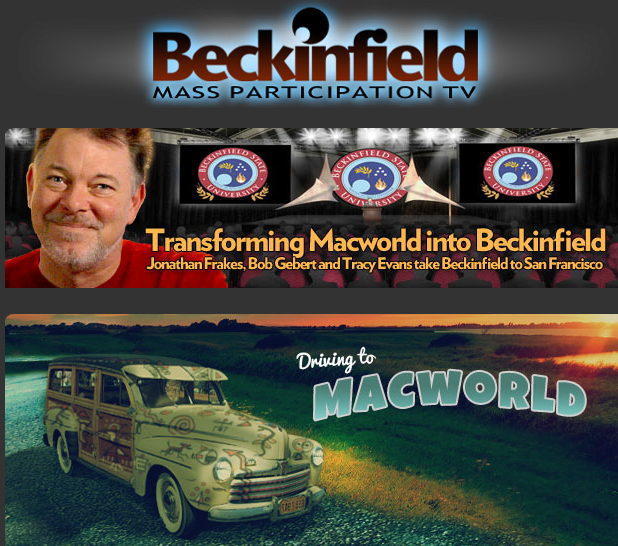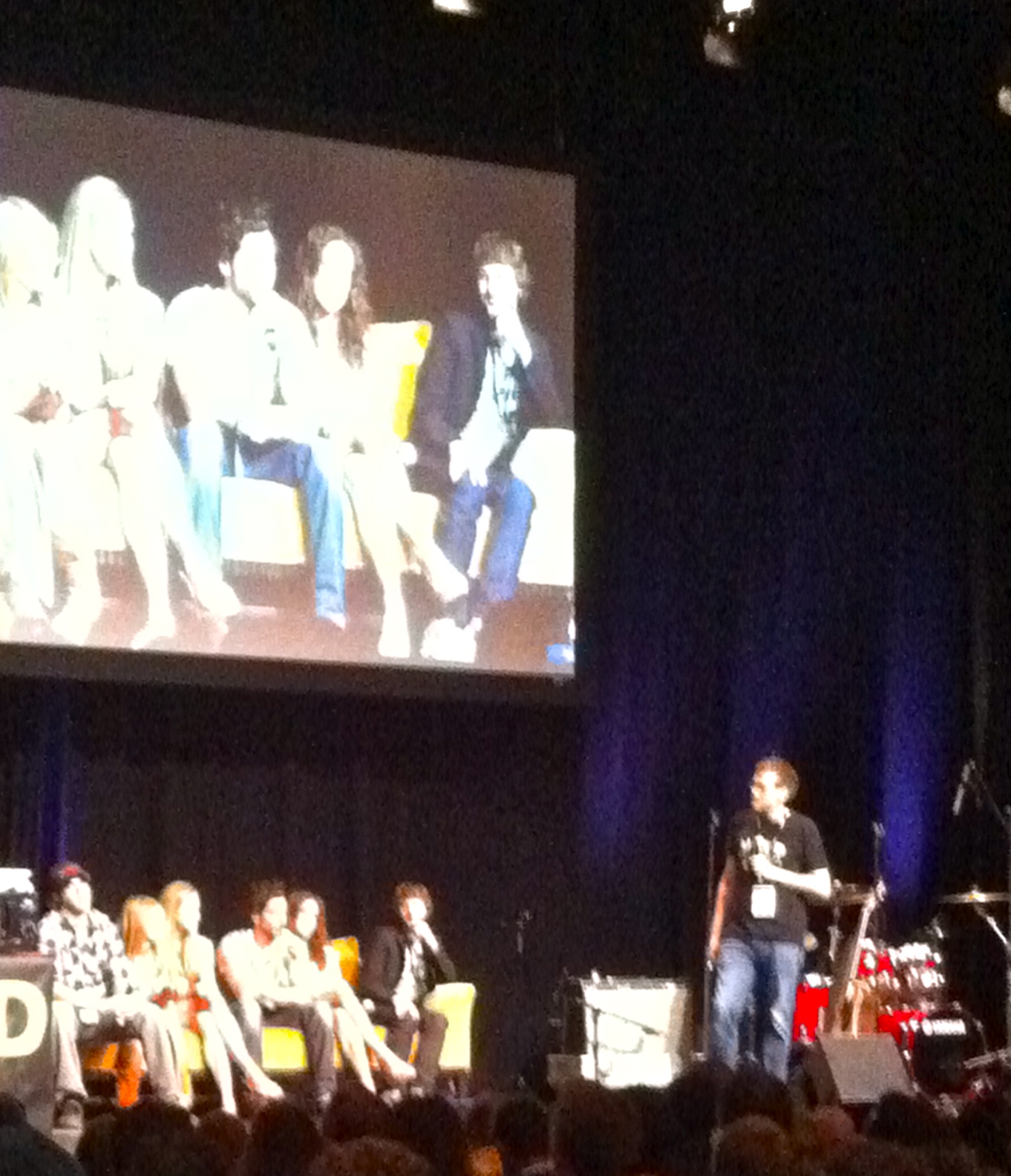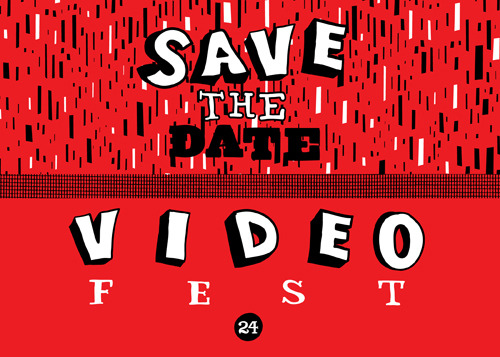Beckinfield – The Haunted Town Where the Audience Creates the Story
 Monday, February 6, 2012 at 5:21 PM by
Monday, February 6, 2012 at 5:21 PM by  Nick DeMartino
Nick DeMartino Residents of the fictional town of Beckinfield have a lot going on, what with all the ghosts and other supernatural intercessions that keep popping up.
But the townspeople are nowhere near as busy as some visitors to "Beckinfield," a website that presents an ongoing sci-fi series about the town in a format unlike any TV you've ever seen.
That's because the story is told entirely by means of first-person video diaries – in-character performances created by users and upload to the site.

The Beckinfield story unfolds continuously -- a kind of never-ending soap opera for the YouTube set. Every audience member's experience of the story is individualized, since one's view depends upon which characters one chooses to follow and watch. A weekly edit -- "previously on Beckinfield" -- provides a summary of story highlights. The site's tagging and trending tools also help guide the user experience.
Suffice it to say: the Beckinfield user is an engaged user -- whether choosing to perform or just watch.
The performers of course are all unpaid. Some are aspiring actors; others are amateurs from all around the world. More than 4,000 of them have registered since Beckinfield's "soft" launch at the SXSW conference in March, 201l. 10% are actively uploading content on a regular basis.
New members are presented with an online form, just like any social network sign-up process – but in doing so, they create their character. Once a user starts uploading video clips, they receive a weekly newsletter -- a sort of serialized story Bible. Actors are encouraged to reflect plot points in their performances and to collaborate with other actors to create interrelated story threads.
"The show is written and plotted, but not scripted," says co-founder Bob Gebert, an actor, director and writer who evolved the idea while helping fellow actors promote themselves using YouTube.
"Just like reality television," he said, somewhat sheepishly.
Or a cross between Desperate Housewives and Dungeons and Dragons, as one Beckinfield actor put it.
A more relevant precursor is the 2006 YouTube hit "Lonely Girl 15," which initially seemed to be the webcam confessions of troubled teens, but turned out to be professional actors playing roles with improvisational brio. LG15 was groundbreaking, not only because of the mass trick that its creators played on viewers, but because the then-new YouTube platform enabled viewers to upload their own video reactions, creating a crazy-quilt structure for the experience of the story.
 Lonely Girl 15 Reunion at Vidcon 2011
Lonely Girl 15 Reunion at Vidcon 2011
While YouTube itself was becoming the venue of choice for a new class of entrepreneurial performers, many L.A. actors saw online video as a means to get noticed within the industry -- a low-budget "American Idol" for actors.
So Gebert began coaching actors to create improvisational monologues to showcase their talent, a process, which had evolved into a web site where 25 actors created characters -- all situated in a fictional town.
"It ran for about five weeks," said Gebert, "but there was no plot, so the whole thing just fell apart…. I learned that you need an ongoing story."
Gebert pitched the idea to Tracy Evans and Biff Van Cleve, interactive producers from Houston, where Gebert had run an improv-based dinner theatre. The three co-founded Theatrics in 2010 to develop the underlying platform and support the storytelling being showcased with the Beckinfield story, which Gebert writes.
Theatrics has raised $1.4 million of seed funding to develop the site, most of it from investors in Houston whose previous experience has been in the oil business -- certainly a rarity in the go-go world of Internet start-ups.
In January they stormed San Francisco’s MacWorld/iWorld, where they turned the stage into yet another scene set in the town of Beckinfield, the finale to an in-story competition to cast a local production of the "Legend of Beckinfield."
An actor named Michael Town, playing a character named Farmer Roger Teddy was the winner of the "ultimate online audition", a prize worth $10,000 and the chance to star in a play being produced inside Beckinfield. Very Pirandello!
The MacWorld gig provided exposed the company to the Bay Area's tech community, and netted coverage by Mashable and some meetings with new investors, according to Gebert.
It will be fascinating to see if there's an appetite among tech investors for a story-centered platform like Theatrics, which has dubbed its concept "mass participation television."
Theatrics' blend of user-generated content, Hollywood visibility, social networking, and guided story structure is quite unique, raising a lot of fascinating questions as story forms continue to evolve. For instance:
Could such a platform be used as a transmedia companion for conventional television series, creating a kind of video-based fan fiction? I can imagine this for the adventurous network or cable show-runner (and, I can also imagine the meeting with the network lawyers).
- Is Theatrics a social network for actors or a consumer viewing platform? Ideally, both, of course, but clearly to date, the tilt has been to create "an intimate experience for actors, a dream stage for them," as Gebert puts it. Theatrics has invested in "backstage" tools to attract and support actors, who, after all, are creating the content. The next challenge is to attract a viewing audience to the story these actors (and the site team) are co-creating. It may well be that the audience appeal of role-playing games and virtual worlds will trump the conventional divide between audience and creators.
- Will this story-driven viewing experience scale? Social websites like Facebook and YouTube are built on the 80:20 rule, e.g., they attract vastly more members to consume the content produced by a small minority of "super producers," as a recent Pew study noted.
- What about curation? I suspect that audience growth will be capped unless the site embraces some form of user-generated curation, enriching the story container for the view-only visitor and the more active participant alike. The web is aflame with different tools that allow users to edit, curate, and shape the presentation of content--- a natural consequence of the proliferation of content. Of course, curation can also lead to the "hot chicks" problem -- telling a story based entirely upon, shall we say, non-story elements.
- Finally, is the co-creation movement trending up or flattening? What started as an academic analysis of the customer-created value in business, we are now seeing considerable heat applied to the co-creation paradigm in all sorts of business. The question is how long it will take to attract and retain an audience to these new forms of collaborative, participatory storytelling. (As with this site by transmedia innovator Scott Walker.)
Go ahead: Test drive Beckinfield and see what you think. If you have the time and inclination, create your own character and see what happens. (I thought I would , but I chickened out).
 Beckinfield,
Beckinfield,  Theatrics,
Theatrics,  actors,
actors,  storytelling,
storytelling,  video in
video in  Hollywood,
Hollywood,  Internet,
Internet,  Media,
Media,  Video,
Video,  design,
design,  future,
future,  social-media,
social-media,  studios,
studios,  technology,
technology,  television ,
television ,  transmedia
transmedia  Print Article
Print Article 